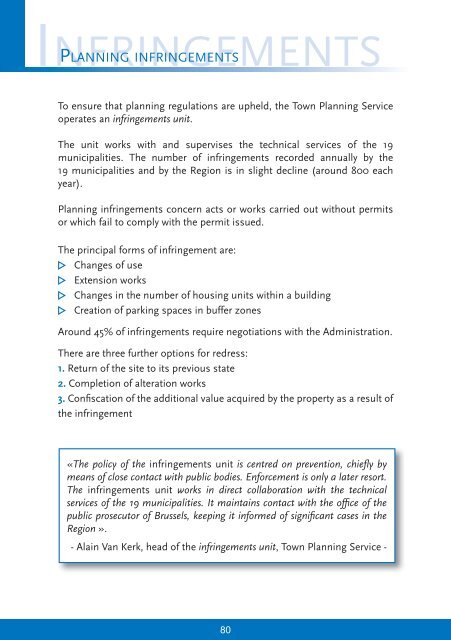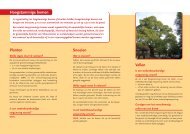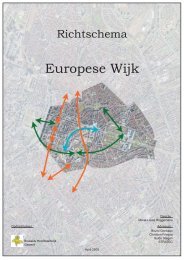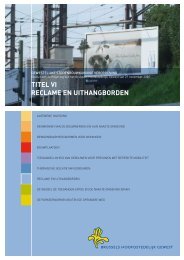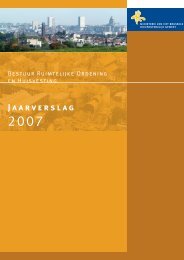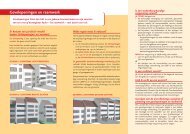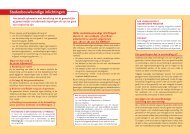L'URBANISME STEDENBOUW TOWN PLANNING - Ruimtelijke ...
L'URBANISME STEDENBOUW TOWN PLANNING - Ruimtelijke ...
L'URBANISME STEDENBOUW TOWN PLANNING - Ruimtelijke ...
Create successful ePaper yourself
Turn your PDF publications into a flip-book with our unique Google optimized e-Paper software.
In f r I n g e m e n t s<br />
pl A n n I n g I n f r I n g e m e n t s<br />
To ensure that planning regulations are upheld, the Town Planning Service<br />
operates an infringements unit.<br />
The unit works with and supervises the technical services of the 19<br />
municipalities. The number of infringements recorded annually by the<br />
19 municipalities and by the Region is in slight decline (around 800 each<br />
year).<br />
Planning infringements concern acts or works carried out without permits<br />
or which fail to comply with the permit issued.<br />
The principal forms of infringement are:<br />
Changes of use<br />
Extension works<br />
Changes in the number of housing units within a building<br />
Creation of parking spaces in buffer zones<br />
Around 45% of infringements require negotiations with the Administration.<br />
There are three further options for redress:<br />
1. Return of the site to its previous state<br />
2. Completion of alteration works<br />
3. Confi scation of the additional value acquired by the property as a result of<br />
the infringement<br />
«The policy of the infringements unit is centred on prevention, chiefl y by<br />
means of close contact with public bodies. Enforcement is only a later resort.<br />
The infringements unit works in direct collaboration with the technical<br />
services of the 19 municipalities. It maintains contact with the offi ce of the<br />
public prosecutor of Brussels, keeping it informed of signifi cant cases in the<br />
Region ».<br />
- Alain Van Kerk, head of the infringements unit, Town Planning Service -<br />
80<br />
81<br />
AppeAls<br />
The Order of 14 May 2009 amending the Order of 13 May 2004 ratifi ed by the<br />
CoBAT came into force on 1 January 2010. This reform is aimed particularly<br />
at streamlining the appeals procedure. Thus the dual appeals system has<br />
been replaced. The Planning Panel has now become an advisory body and<br />
the Government is the sole authority for appeals.<br />
The following distinction is used to determine which law applies to new<br />
appeals:<br />
1. Appeals entered after 1 January 2010 against a decision by the issuing<br />
authority made before this date are treated according to the old procedure.<br />
Thereafter, an appeal can be brought by the Planning Panel against a decision<br />
by the municipal executive or the offi cial responsible (or in the absence of a<br />
decision by the latter).<br />
The municipal executive, the offi cial responsible and the applicant may<br />
lodge an appeal with the Government against the decision of the Planning<br />
Panel (the applicant may also appeal in the absence of a Planning Panel<br />
decision).<br />
In 2009, around 180 appeals were lodged with the Planning Panel and 70<br />
with the Government.<br />
2. Appeals brought to the Government after 1 January 2010 against a decision<br />
made after 1 January 2010 are treated following the new procedure.<br />
The Planning Panel has become as advisory body. It delivers its opinion to<br />
the Government within 60 days of receipt of the appeal (within 75 days if a<br />
hearing has been requested).<br />
The Government announces its decision after receiving the opinion of the<br />
Planning Panel or, in the absence of such an opinion, at the expiry of the<br />
legal time-limit. Should the Government fail to announce a decision within<br />
this timescale, either party may issue a reminder to the Government.<br />
The Government may grant the permit, amend the permit with conditions<br />
intended


